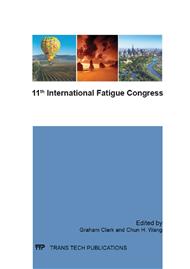p.1341
p.1347
p.1353
p.1360
p.1366
p.1372
p.1379
p.1385
p.1391
AZ31 Magnesium Alloy Multiaxial LCF Behavior: Theory, Simulation and Experiments
Abstract:
In this work it is studied the low-cycle fatigue behavior of the magnesium alloy AZ31-B at several total strains under uniaxial and multiaxial cyclic loading conditions. Cyclic tests were carried out in a biaxial servo hydraulic machine under strain control at room temperature. Test specimens were machined in an hourglass shape from extruded rods. The total strain amplitudes started at 0,2% and ended at 1.4% regarding the von Mises equivalent strain. The particular mechanical behavior inherent to this type of materials, hexagonal closed pack microstructures, leads to conclude that it is necessary to have a numeric elastoplastic model based in experimental tests. In this paper is presented a numerical model based on stress-strain experimental data. The objective is to modulate several physical mechanisms inherent to the magnesium elastoplastic behavior. In order to validate the achieved model the numeric estimations were correlated with the experimental data and with the Jiang & Sehitoglu plasticity model. Results show that the implemented model modulation is in agreement with the experimental data. Some differences between the Jiang & Sehitoglu and the implemented model regarding the magnesium hysteresis loop modulation are pointed out.
Info:
Periodical:
Pages:
1366-1371
Citation:
Online since:
March 2014
Authors:
Keywords:
Price:
Сopyright:
© 2014 Trans Tech Publications Ltd. All Rights Reserved
Share:
Citation:


